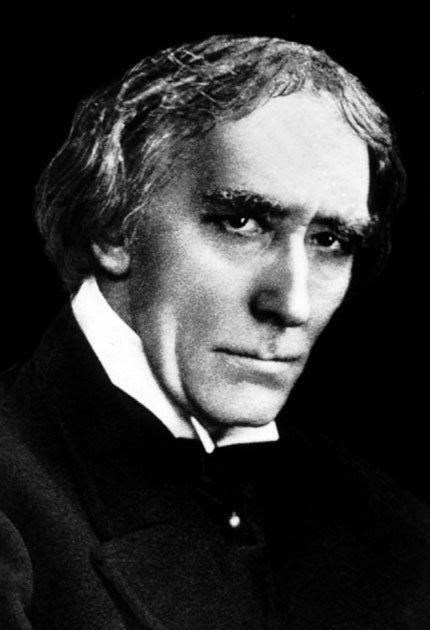Sir Henry Irving: The Guv'nor is still taking centre stage
Sir Henry Irving's Somerset home has been honoured with a plaque. Charles Nevin joins the theatricals at the ceremony

It was a challenge even for an unveiling ceremony, always a touch tricky to pull off. The wind was blowing and the crowd was on the other side of the main road to Somerton. But the old actor was up to it. He has, after all, given us his Lear; and the pauses while passing cars blocked him from his audience were effortlessly achieved.
Laughter, applause, plaque revealed: you sensed that its subject, Sir Henry Irving, Britain's first theatrical knight, more informally known, still, over 100 years later, as the Guv'nor, would have approved of this honouring of his birthplace, a cottage in Keinton Mandeville, Somerset. True, Sir Henry might have been rather more dramatic, but this old actor was Richard Briers, who prefers genial.
"Thank you very much, one and all – the pub's that way," he concluded, genially. Keinton Mandeville, which had turned out in force, was impressed. They are proud of their famous son, and rightly so: Irving, born John Henry Brodribb, on 6 February, 1838, the son of a commercial traveller, became the greatest actor of his time and almost single-handedly made acting respectable (well, all right, more respectable).
London's cabmen tied black ribbons to their whips when Irving died in 1905. He was buried in Westminster Abbey. Once, members of the profession would stand at the mention of his name. Such is the continuing reverence that there was ready approval from the local authorities and readies from Equity and the enthusiastic Irving Society when two admirers, Jeremy Burnham, actor and screenwriter, and his actress wife, Veronica Strong, proposed the plaque.
Why? For Richard Briers, it's the romance of Irving's story: "the Knight from Nowhere", Max Beerbohm dubbed him, sent away from home at the age of four, doggedly pursuing his early ambition through a stammer and the Ugly Sister in Cinderella to acclaim as Hamlet and a triumphant career as actor manager. There was death in the arms of his dresser, a lost unforgotten first love, a disapproving Methodist mother, a wife he never spoke to again after she scorned his art, and a tantalisingly unclear friendship with his stage partner, Ellen Terry, another of those rare names that still resound in a world of passing fame.
The acting, said Briers, was romantic as well: "The old-fashioned theatre was rather like opera today. Irving had these huge sets, and he was wonderful at atmosphere and lighting, especially himself. I once asked a very old actor who had seen him how he'd compare with great actors today and he said, 'Laddie, he'd have frightened them all to death'."
The pub was full of those who had taken the Briers direction: villagers, local dignitaries, a coach-borne deputation from Equity and members of the Irving Society including several generations of Irvings and a Terry. There were speeches and some fine ham for lunch, prompting the obvious question. His few short recordings are pretty stagy, with stresses in strange places, slightly reminiscent of Robert Peston. But, like all the great actors, he had a hypnotic quality: "They're quite different people," said Briers, 77 now. "They come on and you say, 'Oh, bugger! Why can't I be like that?!'"
At the cottage, Les and Ivy Mason are always happy to show visitors the downstairs room where the First Knight was born. They are of senior years, but feel ready for anything since they opened the door in paint-spattered overalls and curlers respectively to discover Sir Donald Sinden, a great admirer, dominating their doorstep.
There is now talk of an Irving Museum, although Keinton Mandeville, understandably, is not quite so keen on "The Knight from Nowhere" bit. Later, too, Sir Henry recalled it as a "godforsaken place". Still, it was where he was bitten by a sheep. And he did give the church five guineas towards new bells (they need a new frame now, by the way, if you're an admirer, or just flush).
Join our commenting forum
Join thought-provoking conversations, follow other Independent readers and see their replies
Comments
Bookmark popover
Removed from bookmarks